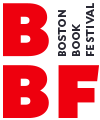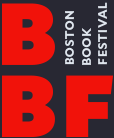Q&A with Cathryn Mercier, Chair of the Children’s Literature Department at Simmons
The Boston Book Festival has had a long-time partnership with Simmons University, especially its Department of Children’s Literature, with whom we collaborate on programming, volunteer opportunities, internships, session hosting, and more. We wanted to ask Cathryn Mercier, chair of the department, about what this partnership means for Simmons, especially this year.
What does a sponsorship of the BBF mean to Simmons and the Children’s Literature Department? How do Simmons faculty and students get involved with book festival events?
Our sponsorship invests in the reading lives of the youngest and future generations as they listen to keynote speakers, talk with artists, and meet writers. Our graduate students volunteer and become an immediate part of the reading lifeline of the city. Our faculty moderate conversations where authors share their creative process or give insight to some of the knots of writing. These are opportunities for illumination—of literature, of self, of community. Finally, we are so proud of the BBF and its work; we’re particularly proud that the event was imagined and founded by one of our graduates, Deborah Porter. The whole event celebrates the things our program values: readers and reading, young people and creativity, civic engagement and responsibility, familiar and new friends.
How is Simmons University engaged as an active member in civic conversations around Boston? Besides the BBF, how else do you see Simmons engaging with the community?
At Simmons, commitment to community based learning and research cultivates civic agency in students and faculty, promotes socially responsible leadership, and sees that the futures of the University and our city are inextricably connected in co-creating a just future. Students participate in everything from JumpState to middle-school pen-pal programs, and work at 826Boston and develop curriculum for graduate programs in social work, health studies, and library science, which all help place them in work and internship positions throughout city agencies, hospitals, and public service organizations. One example of faculty engagement includes scientists who study the health and ecology of the Muddy River.
What efforts have you seen at Simmons in general, and in the Children’s Literature Department more specifically, to create a sense of campus community during this period?
Our new University President, Dr Lynn Perry Wooten, gives us reason to celebrate the potential of what our community will become under her leadership. In the pandemic, she has focused on learning and relationships, and she sees higher education as needing to address systemic racism. Our community read, What the Eyes Don’t See: A Story of Crisis, Resistance, and Hope in an American City by Dr. Mona Hanna-Attisha, began our discussion this year around “the role of developing citizens who are willing to fight to change the world.”
In ChLit, we host weekly “Virtual Book Nooks” and create programming that celebrates students: a graduate’s debut novel (Julieta and the Diamond Enigma by Luisana Duarte Amendariz), and an alumna’s (Autumn Allen) appointment as the 20–21 Children’s Writer in Residence at the BPL. The Ifill College’s Mentor-in-Residence program welcomes Boston’s activist artist Ekua Holmes in October—with many other larger programs planned for undergraduates out of our excellent Student Life Office. We build community day by day, person by person, relationship by relationship, even book by book. Is it harder on Zoom — yes! Is it impossible, no.
What are you most excited about when you think about the future of Simmons and your department?
I’m excited about Dr Lynn Perry Wooten, our first African American President and an inclusive leader, skilled in crisis management, and powerful in her commitment to positive leadership and diversity. I am always most excited about our students—the new writers, illustrators, teachers, librarians, publishers, booksellers, academics, critics, award committee judges—who change the world one book, one reader at a time. They believe in the power of the book to change the reader, and they charge the reader to change the world.
And back to the BBF before we close . . . you’ve attended many BBF events and moderated more than a few—what has been your favorite session to date, and what are you excited about this year?
This year I’m so pleased that Simmons will sponsor Jerry Craft’s keynote for young people. With words and images, Craft mixes hard truths with moments of liberating humor and asks us all to see the revolutionary in the quotidian.
My favorite past event, though, was the kind of serendipitous encounter that happens all the time at BBF. Kristin Cashore was speaking. I went to the location of her panel and waited in line. When my friend and I were about to be let in—the last people in what had been a long line and a long wait—the teenaged girl behind me wailed and grabbed her friend, nearly weeping, “Oh no! I have to tell her this book [Graceling] changed my life.” I looked at my friend, we nodded, then turned to the two young people and said, “Why don’t you take our seats?” I knew Kristin, I had taught her—she had already changed my life and, more than anything else, she deserved to know that she had changed this young reader’s life.



